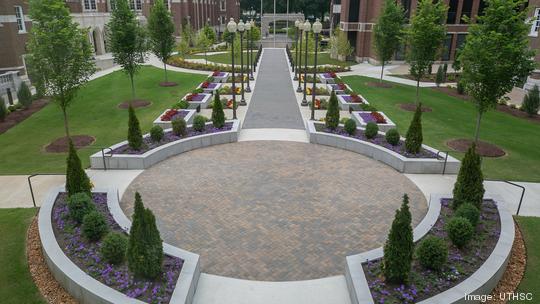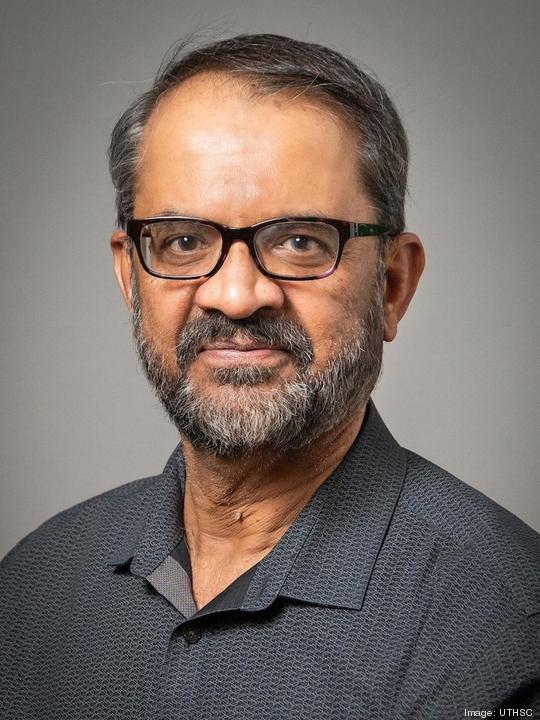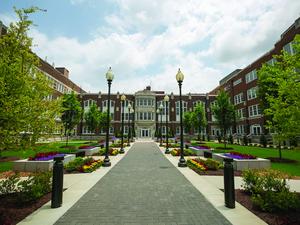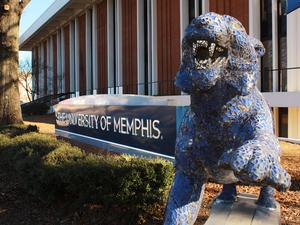
In FY 2022, the University of Tennessee Health Science Center (UTHSC) scored a record $132.9 million in grant and contract awards, a $6.3 million increase from the $126.7 million it earned in FY 2021. It was the sixth-straight year UTHSC had seen growth in grant and contract awards, and it represented a 56% jump from the $85 million it earned in FY 2017.
UTHSC's FY 2023 won't end until June 30. But so far, the institution seems poised for another notable year, as it has continued to rake in major awards.
Here’s an inside look at two of them.

Countermeasures to radiation injury
There’s a chance you haven’t heard of the gut microbiome. But it consists of trillions of microorganisms in the gastrointestinal tract, and it’s involved in functions that are critical to health and well-being. Radiation, however, can alter the gut microbiome’s composition and functions, and this can lead to the development of gastrointestinal acute radiation syndrome.
That’s something else you might not have heard of. But trust us, you don't want it. Gastrointestinal acute radiation syndrome is associated with severe morbidity — think nausea, vomiting, and diarrhea — and high mortality.
Thanks to a new grant, however, a UTHSC faculty member is looking to help combat it and protect against radiation.
Radhakrishna Rao, Ph.D., vice chair and professor in the Department of Physiology, has been awarded a $2.4 million grant from the National Institute of Allergy and Infectious Diseases (NIAID), to develop medical countermeasures to treat gastrointestinal acute radiation syndrome.
“With our knowledge from nuclear disasters in Chernobyl in 1986 and Fukushima Daiichi in 2011, and the nuclear risk in the current Ukraine war, it is necessary to develop therapeutics to treat radiation injury,” Rao said in a release.
The goal is to identify intestinal radio-protective microbiota and understand how they prevent and mitigate radiation injury, while aiming to develop gut microbiome-targeted medical countermeasures that treat radiation injury.
His collaborators on the project are Sun Chin Lee, Ph.D., assistant professor in the Department of Physiology; Francesco Giorgianni, Ph.D., in the Department of Pharmaceutical Sciences; Fridtjof Thomas, Ph.D., professor in the Department of Preventive Medicine; and Laurentia Nodit, M.D., professor in the Department of Pathology.

Prostate cancer in Puerto Rico
According to a press release, Puerto Rican men have a higher prostate cancer mortality than both non-Hispanic white men and Hispanic men living in the U.S. Their prostate cancer mortality is second only to Black men in America, but the demographic has largely remained unstudied. Why?
Because many studies combine men from all Spanish-speaking regions into a single group. They often label them Hispanic or Latino, and ignore regional cultural, economic, and lifestyle differences that could impact a prostate cancer prognosis.
Diabetes, for example, is more prevalent in Puerto Rico than any state or territory. And while diabetes and obesity have been shown to adversely affect prostate cancer prognosis, the effect diabetes has on the prostate cancer mortality in Puerto Rico specifically is unknown.
More light, however, could soon be shed on this issue.
Jay Fowke, Ph.D. — the chief of the Division of Epidemiology and professor in the Department of Preventive Medicine — has received a $1.9 million grant from the U.S. Department of Defense (DOD) to study why Puerto Rican men have higher-than-expected prostate cancer mortality.
He and his team plan to determine if diabetes interacts with obesity to increase the aggressiveness of prostate cancer in Puerto Rican or Black men. And they’ll examine differences in how diabetes and obesity interact between Puerto Rican, non-Hispanic white, and Black men, as they look for mechanisms that could explain the high prostate cancer mortality in Puerto Rico.
The analysis is set to be the first genomic investigation of prostate cancer in Puerto Rico, and the first to investigate the diabetes impact on prostate tissue across these groups. The team's findings could potentially be translated into personalized clinical interventions.
“With this study, we hope to produce results that can be used to develop clinical trials to test careful diabetes and obesity characterization, and personalized diabetes management with obesity to improve prostate cancer prognosis for Puerto Rican, Black, and non-Hispanic white patients,” Fowke said in the release.
According to MBJ research, UTHSC is the second-largest research institution in the Memphis area, based on expenditures, behind St. Jude Children’s Research Hospital and ahead of the University of Memphis.









